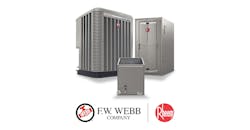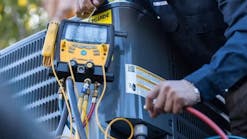People often ask me, "What do you do when people try to negotiate a lower price on replacement jobs?"
The short answer is, "I let them win!"
Some people in this business hate it when a customer tries to negotiate price with them on a replacement job. There is no better "buying sign" than a customer trying to negotiate with you, so I love it when they try to negotiate with me!
If I can get someone to negotiate with me, I'll close them.
Be prepared.
I had a standardized price guide for replacement jobs that I could show people so they knew the prices didn't come out of thin air.
These were the prices I would want to install a on my busiest days of the year. In other words, I had room to move built into them (usually around 20%).
NEVER, and I mean never, present someone with your lowest price first. Always leave yourself a little space for negotiating, even when you know they've already gotten several low-ball bids from your competitors.
First, Get a commitment to Buy!
Don't ever allow someone to start "talking you down" without first getting a commitment to buy if they get the price they want. I can't stress the importance of that to you enough.
Don't ever allow someone to start 'talking you down' without first getting a commitment to buy if they get the price they want.
Once a prospect brings up the possibility of negotiating for a better price, say, "You want a deal, I'll give you a deal. But before we enter into negotiations, it's important to establish one rule. The only reason for you to start negotiating with me is that, as long as you can get a price you feel is more than reasonable, we're going to come to a solid agreement, and you're going to buy right now. You're not going to put off making a decision. Does that make sense to you?" You'll get an agreement.
Don't Compete Against Yourself!
I'll usually say something like, "If you're asking for a lower price, you've got to be basing that on something. I'm guessing that you've gotten other prices and you want me to be a little closer in price to my competitors. Fair enough. Just give it to me straight, how much do you want to pay?"
Let's say we're looking at a $10,000 job. Hopefully, they'll be upfront with me and, for the sake of our example, tell me, "Well, someone else is going to install the exact same thing for $2,000 less than you."
I'll say, "Obviously, if you're trying to get me to lower my price on the exact same thing, you see some differences between me and my competitors, and would prefer to have me do this installation for you, or you'd have just said, 'Thank you for your time,' sent me on my way, and called my lower-priced competitor. Is that right?" Hopefully, I'll get an agreement.
Then I try to get my prospects to sell themselves, and tell me what their hot buttons are by asking, "Why? Why do you want me to do this for you?"
They'll usually come up with a few things to say, and when it looks like they're running out of steam, I just start barraging them with good things to say about my company. Once they start nodding their head, I say, "I see a good $2,000 worth of value in there, don't you?"
They'll usually laugh a little and say, "No. Not $2,000."
I say, "Okay. Well, how much value do you see in that?" On a really good day, I might get a number, but the question usually just throws them off a little and they say they don't really know; that they can't put a number to it.
I'll say, "Well, obviously, if my price were the same as my competitor, or maybe 10% higher, we'd be reaching an agreement right now. Am I correct?" I usually got an agreement to that.
I say, "Well, if I'm at $10,000, and the other contractor is $2,000 less than me, that would indicate that he's around $8,000. Is that fairly accurate?" That's a pretty easy agreement to get. I go on to say, "So, if I was 10% higher, that would put me at $8,800. That's pretty good. If I was at $8,800 we'd go ahead with this?"
You realize that if I built 20% of negotiating room into my initial offer, I could just go ahead and do it for the $8,800, but let's not make it that easy. We'll say that my prospect says yes, that he'd do it for $8,800. It doesn't make any difference, because my next tactic is going to be to say, "Well, I'm afraid I can't do it for $8,800. In fact, I shoot for a 20% net profit when all is said and done. $8,800 is real close to my cost to do this job for you. But at $8,800, we're only $1,200 apart. How much of that $1,200 can you cover to get the guy (me) you really want to do this job for you?"
Usually, you can go back-and-forth a bit, but it's not that hard to get them to split the difference with you.
How to Drop Your Price:
There are people who say you can't just give them a lower price without them accusing you of trying to overcharge them in the first place. They say that, in order to give them a lower price, you have to take something out of the job. That doesn't work, because then they're not getting the deal they want. You're just selling them less, so yes, it costs less.
You just need a valid reason for giving them a sweetheart deal. Let's just say that we agree to a $1,000 discount. Once I get them to make me a firm offer that I can accept, I say, "If I do this for you; I give you the price you negotiated me down to, what will you do for me?"
They'll usually say, "Well, I'll give you the job."
I go on to say, "I'll tell you what I need. Not everyone is like you. Not everyone can meet someone, judge him, and make up his own mind. They need to talk to a satisfied customer or two. But there are privacy concerns. You don't want me running around town telling everyone that I sold you a system and start handing out your phone number, do you?"
They'll say, "Of course not."
I say, "Here's what I need, and I'm willing to pay you to do it by giving you a lower price, and I'm going to trust you to honor your word. I would like your permission to give your contact information to a maximum of six people over the next two years, so they can call you and ask what it's like to do business with me, and all I want you to do is tell them the truth. $1,000 is a lot of money to pay you to do that, but it could pay off for me in the end. Will you do that?"
They're usually so happy and proud of themselves that they talked me down that they're pretty excited and are thanking me.
What I really like about this reason for giving them a price drop: it's legit. It really is nice to have a few people that are willing to take a few phone calls.
Charlie Greer is an award-winning salesman and sales trainer, and the creator of the audio book "Slacker's Guide to HVAC Sales". For more information on Charlie's products and services, go to www.hvacprofitboosters.com or call 1-800-963-HVAC (4822). Email your sales questions to [email protected].








